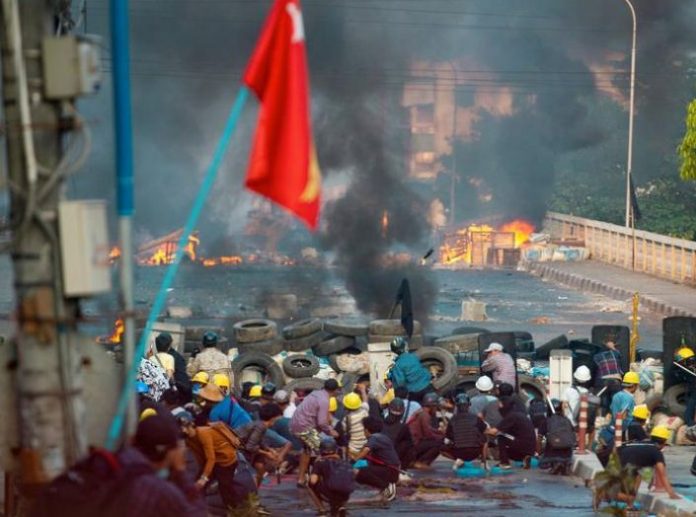Ousted Myanmar lawmakers are exploring whether the International Criminal Court (ICC) can investigate any crimes against humanity committed since the Feb. 1 coup, as an activist group said three more people had died in clashes with security forces.
Military and police are using increasingly violent tactics to suppress daily demonstrations by supporters of detained elected leader Aung San Suu Kyi.
The total number killed in weeks of unrest has risen to at least 224, the Assistance Association for Political Prisoners activist group said, noting another death in the commercial hub of Yangon and two in the cities of Monywa and Bago on Thursday.
Myanmar’s U.N. envoy, who publicly broke with the junta, said a committee of ousted lawmakers was looking at ways people can be held accountable for violence following the coup.
“The ICC is one of them,” Kyaw Moe Tun told an event in New York. “We are not a state party to the ICC, but we need to … explore the ways and means to bring the case to the ICC.”
In Geneva, United Nations human rights experts denounced forced evictions, arbitrary detentions and the killings of pro-democracy protesters. They said foreign governments should consider pursuing those responsible for crimes against humanity.
A junta spokesman has said the security forces have used force only when necessary.
Hundreds have fled Myanmar’s towns and cities since the coup and are sheltering in areas controlled by ethnic militias on the Thai border, an official from one group said.
People have also fled to the Indian side of the border.
INDONESIA ARMY CHIEF CONCERNED
The security forces have focused on stamping out dissent in the commercial capital Yangon. But independent broadcaster Democratic Voice of Burma reported that thousands of people marched on Thursday in the central town of Natmauk.
The Natmauk protest had a symbolic significance as it was the hometown of Aung San, who led Burma’s struggle for independence from Britain but was assassinated in 1947.
His daughter Suu Kyi, aged 75, is also hugely popular for her decades-long campaign for democracy.
The Nobel peace laureate is now detained at an undisclosed location while facing accusations of bribery and other crimes which could see her banned from politics and jailed if convicted. Her lawyer says the charges are trumped up.
Western countries have condemned the coup and called for an end to the violence and for Suu Kyi’s release. Asian neighbours have offered to help find a solution, but Myanmar’s military has shown no sign of seeking reconciliation.
Coup leader General Min Aung Hlaing took part in a video conference with other Southeast Asian defence chiefs on Thursday, his first international engagement since seizing power, state television showed.
During the meeting, the head of Indonesia’s armed forces, Hadi Tjahjanto, expressed concern over the situation in Myanmar, according to the website of the Indonesian military.
A junta spokesman did not answer telephone calls seeking comment.
Indonesia had led diplomatic efforts in Southeast Asia to resolve the crisis but a March 3 regional meeting it helped coordinate failed to make headway.
EU SANCTIONS
The European Union is due to place sanctions on individual military figures on Monday and then target businesses they run in what would be its most significant response so far since the coup.
The EU’s expected sanctions follow a U.S. decision last month to target the military and its business interests. Britain last month froze the assets and placed travel bans on three Myanmar generals.
The army has defended its coup, saying its accusations of fraud in a Nov. 8 election swept by Suu Kyi’s National League for Democracy were rejected by the electoral commission. It has promised a new election but not set a date.
Information within Myanmar is becoming increasingly difficult to verify after authorities have restricted the internet services that protesters use to organise and post reports and pictures.
About 37 journalists have been arrested, including 19 who remain in detention, the U.N. human rights office said.
The United Nations food agency said this week that rising prices of food and fuel meant many poor families faced shortages and hunger.
Source : Reuters
















